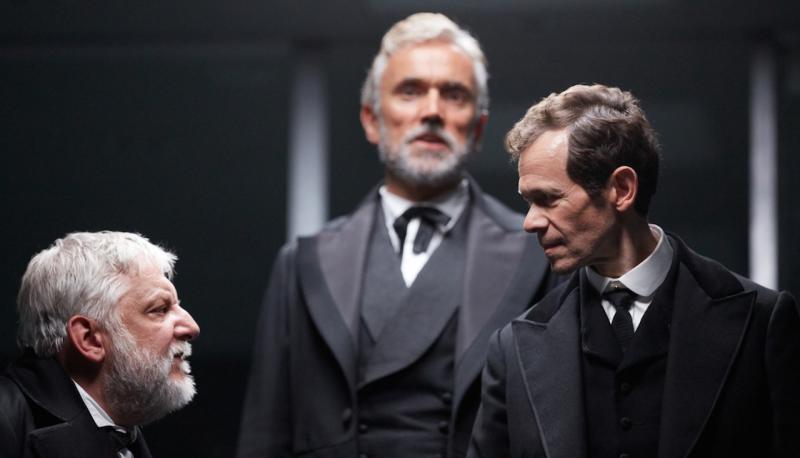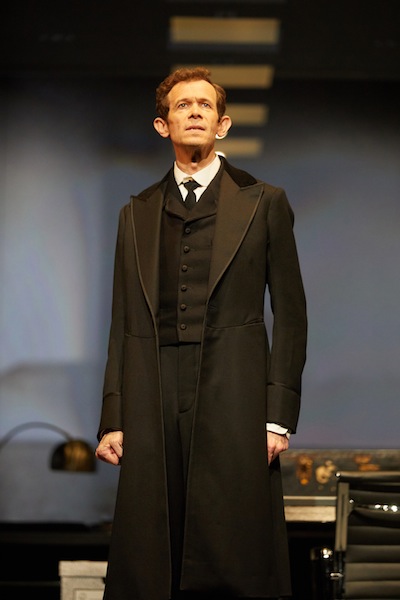The Lehman Trilogy, Piccadilly Theatre review - stunning chronicle of determination and dollars | reviews, news & interviews
The Lehman Trilogy, Piccadilly Theatre review - stunning chronicle of determination and dollars
The Lehman Trilogy, Piccadilly Theatre review - stunning chronicle of determination and dollars
A simultaneously sweeping and intimately human production

Mammon and Yahweh are the presiding deities over an epic enterprise that tells the story not just of three brothers who founded a bank but of modern America. Virgil asked his Muse to sing of ‘arms and the man’, yet here the theme becomes that of ‘markets and the man’: a tale of daring, determination and dollars that chronicles capitalist endeavour from the cottonfields of Alabama to the crash of 2008.
The Italian playwright Stefano Massini first released what started as his five-hour long play on the world in 2013, consciously using the rhythmic verse and formulaic techniques of epic to explode the jargon-cluttered world of finance. It arrived in London via a production in Paris: after director Sam Mendes saw it he asked Ben Power, one of the most intelligently innovative dramaturgs de nos jours, to adapt it so it could be unleashed on English-speaking audiences.
After storming the National Theatre, and then – like its central characters - making a financially beneficial trip across the Atlantic to New York – it now arrives at the Piccadilly Theatre with the same dazzlingly versatile cast of three. Over the course of a little more than three hours, we watch the delightfully unholy trinity of Simon Russell Beale, Adam Godley, and Ben Miles, switch ages, genders, and vocal tics as they evoke 160 years of the firm that has become synonymous with capitalist implosion.
Mendes’s simultaneously sweeping and intimately human production is powerfully refracted through Es Devlin’s brilliant set, a minimalist glass and metal revolving box that can metamorphose from swanky office space to cluttered fabric shop in Alabama. Luke Halls’ powerful video projections mean that we see the action against a vast horizon that shifts from the Atlantic, to the cotton fields of Southern America, to historic and then modern day New York, amplifying the sense that we are witnessing history in the making.
 Yet ultimately this production, which shows Mendes at the height of his powers, in the best epic tradition paints the scenes before us with words. Simon Russell Beale’s Henry Lehman is the first to speak: as the action switches from New York in 2008 to 1844, we see him rise up from boxes containing the detritus of the collapsed bank to talk of his historic voyage from Europe. In his tone of voice alone Russell Beale evokes the enormity of a shift that was inevitably not just geographical but psychological: when he says ‘America. No longer in his mind but there,’ we feel the full force of the transition from imagination to reality. Before too long he is joined by his brothers Emanuel (Miles) and Mayer (Godley): each, in epic style, characterised by an epithet – Henry, the ‘head’ who is always right, Emanuel the ‘arm’ and Mayer who, in a much-deployed joke, is ‘smooth as a just-peeled potato’.
Yet ultimately this production, which shows Mendes at the height of his powers, in the best epic tradition paints the scenes before us with words. Simon Russell Beale’s Henry Lehman is the first to speak: as the action switches from New York in 2008 to 1844, we see him rise up from boxes containing the detritus of the collapsed bank to talk of his historic voyage from Europe. In his tone of voice alone Russell Beale evokes the enormity of a shift that was inevitably not just geographical but psychological: when he says ‘America. No longer in his mind but there,’ we feel the full force of the transition from imagination to reality. Before too long he is joined by his brothers Emanuel (Miles) and Mayer (Godley): each, in epic style, characterised by an epithet – Henry, the ‘head’ who is always right, Emanuel the ‘arm’ and Mayer who, in a much-deployed joke, is ‘smooth as a just-peeled potato’.
Massini wrote this work partly to challenge the hatred of bankers that erupted with full force after the financial crash. It’s impossible, even so, not to be constantly aware that this world-powerful family rose on the back of others’ disasters – whether on the slavery-driven cotton trade, the fall-out from the Civil War, or from refusing to help out other banks during the Crash of 1929. Yet the brilliant, human, performances keep us focused on the potent central story of three Jewish boys who used all their ingenuity to raise themselves from nothing. While this is a story of historic misfortunes, it is also an extraordinary document of human progress: through the Lehmans we see the transformation of America from agricultural to industrial economy, the dawn of the railways, the advent of radio and TV, and the beginnings of the digital age.
Of course, remarkable though they were, the one attribute the three Lehman brothers did not possess was immortality. Luckily each member of the cast proves themselves – Walt Whitman-like – to contain multitudes. Throughout they wear the dark suits of nineteenth-century European Jews: each transformation throughout the decades is through voice and body language. It’s sheer joy to watch Russell Beale, for instance, suddenly metamorphose into the small and precocious Philip Lehman, self-consciously upright with wide blinking eyes. And Adam Godley’s (above) wiry, drily witty evocation of a whole fashion parade of potential sweethearts for the Lehman heir is one of the evening’s showstoppers.
The chemistry between the three actors is superb – Miles fierily assertive, Russell Beale ably negotiating the spectrum from whimsical to philosophical, Godley utterly inhabiting whichever role he takes on. As Bobby – the last surviving Lehman – Godley is particularly strong: an art-obsessive forced by family tradition to be a banker, his counter-cultural style ably whisks the play into the late-twentieth century. By the time we all reach 2008, we feel, in all the best ways, that we have lived for hundreds of years. It’s an evening of deftness and brilliance that forcefully reminds us that maybe all the best things in life aren’t free.
- The Lehman Trilogy at the Piccadilly Theatre till 31 August
- Read more reviews on theartsdesk
rating
Explore topics
Share this article
The future of Arts Journalism
You can stop theartsdesk.com closing!
We urgently need financing to survive. Our fundraising drive has thus far raised £49,000 but we need to reach £100,000 or we will be forced to close. Please contribute here: https://gofund.me/c3f6033d
And if you can forward this information to anyone who might assist, we’d be grateful.

Subscribe to theartsdesk.com
Thank you for continuing to read our work on theartsdesk.com. For unlimited access to every article in its entirety, including our archive of more than 15,000 pieces, we're asking for £5 per month or £40 per year. We feel it's a very good deal, and hope you do too.
To take a subscription now simply click here.
And if you're looking for that extra gift for a friend or family member, why not treat them to a theartsdesk.com gift subscription?
more Theatre
 50 First Dates: The Musical, The Other Palace review - romcom turned musical
Date movie about repeating dates inspires date musical
50 First Dates: The Musical, The Other Palace review - romcom turned musical
Date movie about repeating dates inspires date musical
 Bacchae, National Theatre review - cheeky, uneven version of Euripides' tragedy
Indhu Rubasingham's tenure gets off to a bold, comic start
Bacchae, National Theatre review - cheeky, uneven version of Euripides' tragedy
Indhu Rubasingham's tenure gets off to a bold, comic start
 The Harder They Come, Stratford East review - still packs a punch, half a century on
Natey Jones and Madeline Charlemagne lead a perfectly realised adaptation of the seminal movie
The Harder They Come, Stratford East review - still packs a punch, half a century on
Natey Jones and Madeline Charlemagne lead a perfectly realised adaptation of the seminal movie
 The Weir, Harold Pinter Theatre review - evasive fantasy, bleak truth and possible community
Three outstanding performances in Conor McPherson’s atmospheric five-hander
The Weir, Harold Pinter Theatre review - evasive fantasy, bleak truth and possible community
Three outstanding performances in Conor McPherson’s atmospheric five-hander
 Dracula, Lyric Hammersmith review - hit-and-miss recasting of the familiar story as feminist diatribe
Morgan Lloyd Malcolm's version puts Mina Harkness centre-stage
Dracula, Lyric Hammersmith review - hit-and-miss recasting of the familiar story as feminist diatribe
Morgan Lloyd Malcolm's version puts Mina Harkness centre-stage
 Reunion, Kiln Theatre review - a stormy night in every sense
Beautifully acted, but desperately grim drama
Reunion, Kiln Theatre review - a stormy night in every sense
Beautifully acted, but desperately grim drama
 The Code, Southwark Playhouse Elephant review - superbly cast, resonant play about the price of fame in Hollywood
Tracie Bennett is outstanding as a ribald, riotous Tallulah Bankhead
The Code, Southwark Playhouse Elephant review - superbly cast, resonant play about the price of fame in Hollywood
Tracie Bennett is outstanding as a ribald, riotous Tallulah Bankhead
 The Lady from the Sea, Bridge Theatre review - flashes of brilliance
Simon Stone refashions Ibsen in his own high-octane image
The Lady from the Sea, Bridge Theatre review - flashes of brilliance
Simon Stone refashions Ibsen in his own high-octane image
 Romans: A Novel, Almeida Theatre review - a uniquely extraordinary work
Alice Birch’s wildly epic family drama is both mind-blowing and exasperating
Romans: A Novel, Almeida Theatre review - a uniquely extraordinary work
Alice Birch’s wildly epic family drama is both mind-blowing and exasperating
 The Producers, Garrick Theatre review - Ve haf vays of making you laugh
You probably know what's coming, but it's such great fun!
The Producers, Garrick Theatre review - Ve haf vays of making you laugh
You probably know what's coming, but it's such great fun!

Add comment